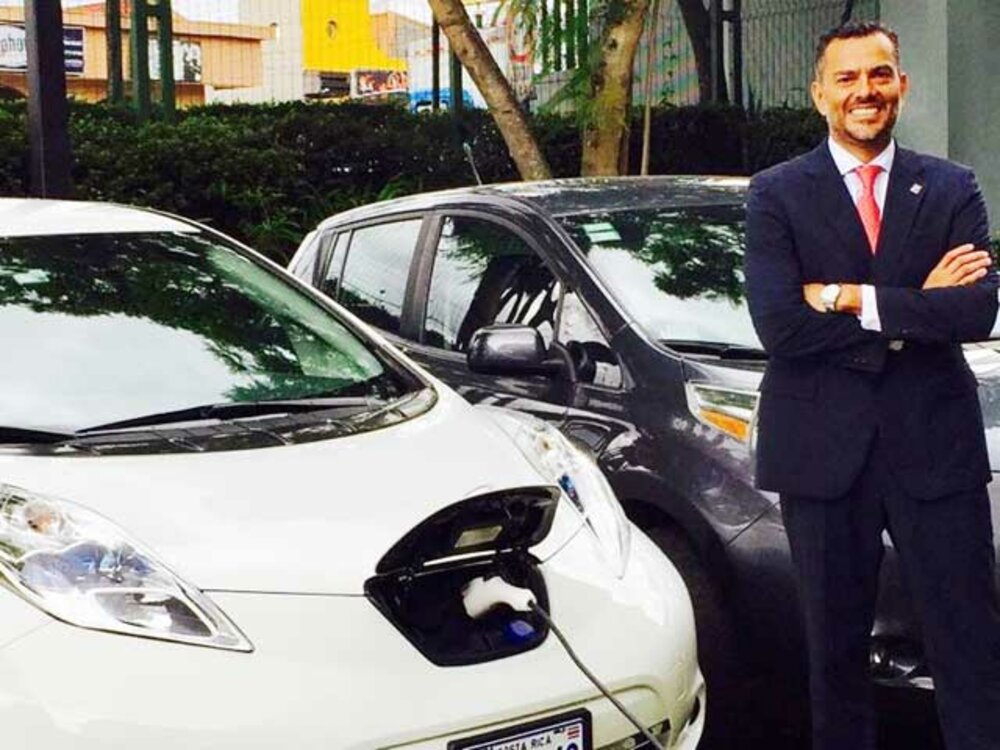CABEI promotes environmentally friendly transportation in Costa Rica

US$10 million allocated towards sustainable transportation.
SAN JOSE, July 31, 2017 (AFP SERVICES/CABEI). The Central American Bank for Economic Integration (CABEI) is promoting an awareness raising campaign among the Costa Rican population to promote the use of clean energies in public or private transportation that can serve as a pilot plan for the development of sustainable transportation throughout Central America.
CABEI Country Manager for Costa Rica, Mr. Mauricio Chacón Romero stated that, “The Bank is promoting sustainable mobility mechanisms with technologies involving electricity and supporting the implementation of relevant projects within the framework of the Paris Agreement (CC-2015), thus reducing the emission of carbon dioxide in productive activities and promoting environmentally friendly transportation."
Mr. Chacón added that, “CABEI seeks to support the efforts of a number of Costa Rican public and private institutions to establish efficient energy mechanisms in the transportation, residential and industrial sector by promoting environmentally sustainable investments; this is in line with efforts lead by the Costa Rican Electricity Institute (ICE), which has been carrying out national actions to ensure that electricity generation is almost entirely produced from clean sources, whether hydro, geothermal, wind or solar.”
Since its founding, CABEI has taken a key role in strategically promoting financing for renewable energy and energy efficiency throughout Central America. The implementation of the CABEI 2015-2019 Institutional Strategy “Integrating Sustainable Development and Competitiveness," has consolidated its relevance and efficiency to promote initiatives in the energy sector, which is why the Bank is currently promoting this awareness raising campaign towards sustainable transportation through forums, seminars, festivals and meetings with small and medium enterprises in order to highlight the benefits of electric technologies in both public (taxis, buses, trains) and private (personal cars, electric bicycles, others) sectors.
Mr. Chacón also explained that, "CABEI is involved in these emerging initiatives because they are in line with one of its most important focus areas, which is regional development. Historically, the Bank has contributed a large amount of financial resources to the field of energy, channeling approximately US$14 billion to the region in recent years. CABEI has also promoted important financial intermediation programs in this line, such as the Green MSME Initiative. In addition, it has promoted the direct financing of projects for the generation, transmission and distribution of electricity, the majority from renewable sources.”
The Green MSME Initiative channels resources surpassing US$40 million in credits for energy efficiency and renewable energy projects in Central America. A part of the initiative promotes the substitution of hydrocarbons by non-polluting energies in the vehicle fleet of each of the countries of the region. Furthermore, in order to promote this regional transformation, the initiative has destined approximately US$10 million for vehicle replacement and conversion.
The CABEI Country Manager for Costa Rica added that, "The Bank seeks a transformation towards sustainable transportation, and it is aware that each country will require a considerable amount of financial resources to transform its transportation systems into environmentally friendly mobility structures.”
Electrical mobility
Mr. Chacón highlighted that "The vast majority of CABEI interventions have a regional scope; so what is developed in any of the region’s markets or countries can be effectively replicated in other markets, which is why the sustainable transportation system initiative is initially being promoted with great emphasis in Costa Rica with the vision of replicating in the near future in other countries inside and outside the region.”
It is expected that the users will learn about the economic and environmental benefits of moving towards sustainable technologies that use renewable energies in the country’s public or individual transportation mechanisms in both rural and urban areas
.
"Electric mobility is not exclusive to Costa Rica. To a greater or lesser extent, many countries are adopting it," said Chacon. He gave an example of Norway and China, noting that in the latter country there are more than 170,000 electric buses in circulation. He added that, "It is probable that for China, this is a reduced number of units compared to the totality of its vehicle fleet, but it is a sign that already countries with highly technologically developed economies perceive this as extremely relevant. Practically 100% of Norway’s transportation system uses renewable energy sources." He also highlighted that, "Electric mobility is not the transportation of the future, but of the present."
Mr. Chacón also commented that, “In Costa Rica, there is already talk of electric buses and an electric train to mobilize passengers. I would stress that the issue is already in the minds of Costa Rican inhabitants. It is a phenomenon that is already happening. The Government and public and private institutions are already undertaking joint efforts in the creation of norms, regulations and infrastructure necessary for electric and sustainable mobility."
He added that, "Costa Rica has been working on different fronts involved in the creation of laws and with financial institutions that wish to support the purchase of electric vehicles. We join in the promotion of programs with civil society organizations, implementation of technical-financial courses and preparation of infographics to inform people of what this transformation is all about, explaining what an electric vehicle is, how it works, what technology is available at a global level, and highlighting the advantages and savings that this type of investment generates."
Mr. Chacón concluded by mentioning that, "CABEI was a pioneer in the financing of electric generation projects with such renewable sources as wind and geothermal. Subsequently, other financial institutions that supported the sector joined the effort. In the particular case of Costa Rica, institutional counterparts that have been receiving its financial resources, such as ICE, have historically lead efforts to develop such energy generation projects, and currently, they add new joint efforts in sustainable mobility pilot projects that include considerable environmental, social and economic benefits for the country by integrating sustainable technologies to mobilize inhabitants, providing renewable energy supply and using electricity supply networks, which are considered as extremely significant sustainable development investments by the Bank and by international cooperation entities."











